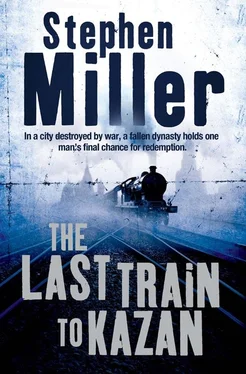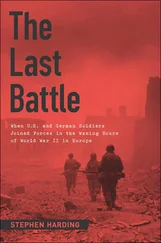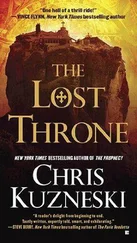It was crowded there, and it only enhanced Ryzhkov’s impression that he was being drawn into a great throat, sucked out from the sun into the blinding darkness – a place of screaming whistles and shouted commands in a dozen languages echoing beneath the great chambered roof. Into the dark cavern with not even time enough to feel what it was like to be a free man in Moscow, as if there were such a thing.
A Red Guard asked for his papers. He showed them and was moved right along to a sergeant seated at a desk at the head of the stairs. It was like a conveyor belt for people with the correct documents, and he kept moving the entire time. No one even really touched him. When they saw that he was Cheka, and only interested in speed, it got them all jumping. He passed through a mass of bawling refugees, a sergeant running along with him for half of his walk, checking his papers on the fly, and doing everything in his power not to salute. The Cheka was just like the old Okhrana, Ryzhkov thought, only with different uniforms. A black leather raincoat instead of the cheap rubberized canvas ones he’d worn as a plain-clothes gorokhovnik. The teams had changed; the flags had shed their blue and white colours and evolved into revolutionary red; the double-headed eagles had all been knocked to the ground. You walked along and counted the blemishes on architecture throughout the city.
The sergeant fell away and he arrived at track 4 and his carriage, climbed in to find his compartment, which he had all to himself for a time. He wondered why he was getting such deference and then looked at his identity papers. They’d made him an inspector with the internal unit of the Cheka. Rank of captain. Obviously doing something important since he was travelling alone with a single rucksack.
He pulled down the shades, put the rucksack on the seat opposite and looked through it, found the pistol they’d given him, an ugly Mauser. Read his instructions, a sentence of brief gibberish, a simple cipher system that he could use, a cable address, NOSMOC4, and a wireless address which would probably be useless.
He put everything away and raised the shades. At the very far end, a hospital train had emptied and was being swabbed out. There was a whistle, a porter ringing his bell. With a tremble and then a lurch his train began to glide out of the station and he looked out the window to watch the great vaulted ceilings slip away and give over to sky.
Another Chekisti came past the door, then backtracked, checked the number of the compartment and came in. His name was Sudov. Ryzhkov had a good look at him and found him pathetically young. Working hard on his first beard, a little trill of red hairs over his lip. He was going out to his first assignment, to assist the commissar in Perm. He deferentially made room so Ryzhkov could put his feet up, and they talked.
Sudov was from Petersburg. There was no food there at all, he said. Perhaps now, in summer, but back in the winter there had been no food. The boy had loved it there, the skating games in the winter, the American hills – a kind of artificial sledding ramp that had been set up on the Field of Mars, girls with rosy cheeks, the bonfires. His favourite time.
‘Did you ever go to the Komet?’ Ryzhkov asked him.
‘Where’s that?’
‘It’s a night club just off Sadovaya Street. They did plays there before the war.’
‘No, no, I don’t know it. I was too young, my parents would never let me.’ He smiled. ‘I went to the Peaches Club, though. That was a place for good times.’
Listening to young Sudov Ryzhkov fell into a long slow dreaming. With the outskirts of Moscow slipping away, the train rocking between the switches on the way out of town, dreaming about Vera and the old Komet club and all of it. That one single good year, their only year. When Ryzhkov fell into sleep the boy was still rhapsodizing about the quality of chocolates you could by at Eliseffs on the Nevsky Prospekt. ‘Perfection,’ he said. ‘The very best, like no other place on earth.’
Outside the window is Russia. The summer sun burns down to a cloudless sunset that fades to green, passing into the red dusk, the night air rising that sets the trees, the laundry the women have hung out, the dried straw along the side of the roadbed, all to waving. A great warm wind rises out of the earth, and when the train stops you can hear it moaning through the windows. The train itself, a place of eerie sighs; the soldiers writhe in their lonely torment, clutching their genitals, pushing their companion’s shoulder away, and grumbling in their sleep.
Ryzhkov passes from dreams to wakefulness in a long series of bumps and jars, knocks and shudders in the night that spark his worst anxieties. Somehow it is more fearful because he is too comfortable; relatively warm and reasonably fed in a time of famine, but unable to sleep, his character out of synchronization with his fellow travellers.
The train is filled with companies of Red Guards being rushed to the front. Ryzhkov, wandering up and down the train in his boredom and to relieve his stiffness, finds himself moving along, looking at the faces of the guards as the sun rises, glaring sharp and bright, causing the men on that side of the car to grope for the shades and turn their faces away. But none can fully escape because the track curves all the way to Nizhni Novgorod, and the fortunes of the sun are always changing.
He is at the head of the carriage when he meets a corporal in the buffer between carriages. The corporal is smoking and talking to a man who has taken off his shirt to shave. They both fall silent as Ryzhkov passes through.
‘Did you hear anything?’ he asks them.
‘All this lot are being sent up to hold Perm. This might be the last train.’
‘It might,’ says the other.
‘So the Whites, they’re almost at Yekaterinburg?’
The corporal shrugs. ‘The big battle is going to be in the south. I heard it from the commander,’ the man says, and pushes forward a cigarette.
‘Thank you very much, comrade. Where are you two going, then?’
‘Well, we’re to get off earlier, at Kazan, but…’ The corporal turns to the second man and they both shrug. Ryzhkov decides to be what is expected, he smiles, bows to the corporal.
‘Well, the Czechs are fast, but we’re fast too,’ he says and they turn and look out the window. The train has begun to put on speed. They should be in Nizhni by the end of the day. All of them racing down the tracks, trying to staunch the wound to Bolshevik Siberia.
‘What about you? Where are you going, comrade?’ the man asks.
Ryzhkov points to the head of the train. ‘All the way to the end,’ and moves along through to the next carriage.
Back in his compartment he inclines his head towards the window. In the far distance is the silver curve of the river that leads towards the ancient river city of Nizhni Novgorod. As the train leans over against the banking of the tracks, Ryzhkov’s view is taken away from the horizon and drawn closer to the sudden clearing of a new woodlot – a flare of pale wood chips and peeled logs. Then the little nub of civilization reaches its limit at a tangle of fencing, and is swept away, and as the carriage levels he sees a thick man standing there tending a wide patch of burning grass, shovel in hand, trying to corral the fire he’s started towards a ditch.
Amid the activity of the Supreme Command headquarters, only one man was in repose: standing quietly in the shadows awaiting the Kaiser’s arrival was Admiral Paul von Hintze, newly appointed Minister of Foreign Affairs. He had been in the job less than a month, and he was tired. There had been little or no time for sleep since his appointment.
Among the staff officers and aides there was an air of controlled yet feverish anticipation. It was the fourth and final attack of General Ludendorff’s great strategic offensive – or the ‘Kaiser Offensive’, as the newspapers would have it – designed to smash through the trenches and the wire, break the will of the French and British, and force a peace on Germany’s terms, before the Americans could arrive and save the day. The great opening bombardment was set to begin at midnight.
Читать дальше












